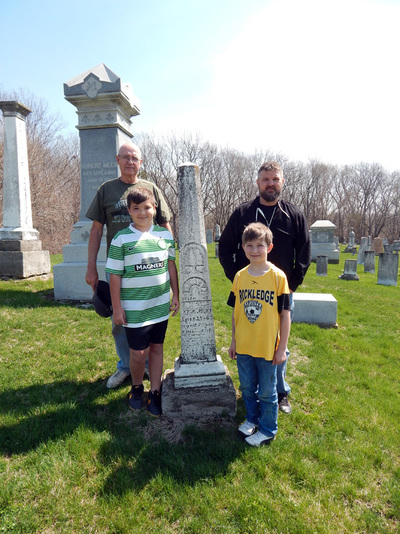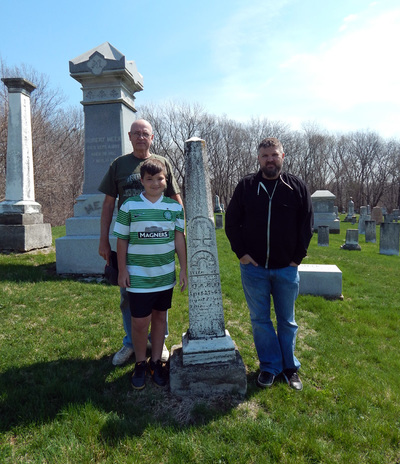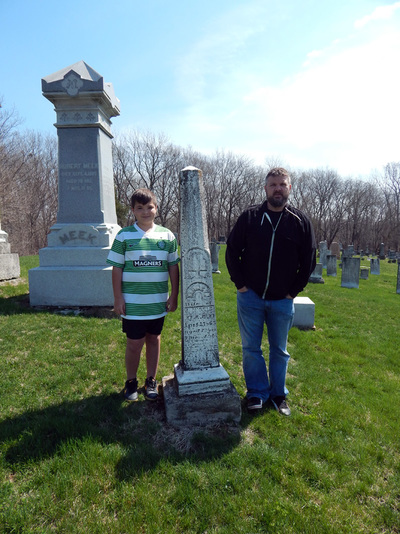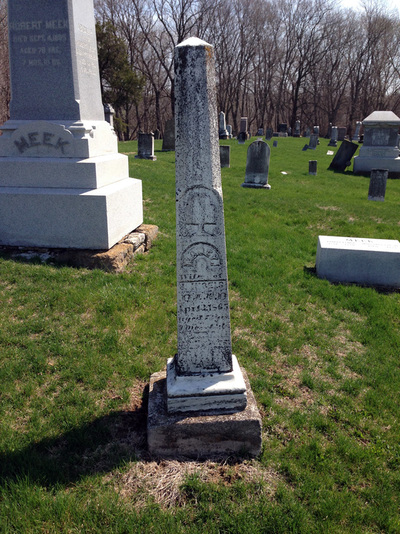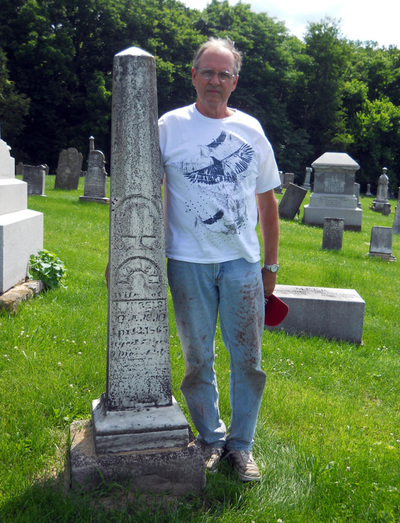Nancy Crooks (Ingels)
Born: 22 Jun 1791
Birthplace: Baltimore, Maryland
Death: 2 Apr 1865
Buried: Bonaparte Cemetery, Van Buren, Iowa
Spouse: Joseph Ingels
Married: 7 Jun 1808
Father:
Mother:
Children: James Ingels, William Thomas Ingels, Sidney Ingels (Collins), Phebe Ingels (Wilhoit), Samuel Ingels, Sarah Ingels (Noble), Harrietta E. Ingels (Nash), Cynthia Ann Ingels (Meek), Wesley Ingels, Benjamin Franklin Ingels
Birthplace: Baltimore, Maryland
Death: 2 Apr 1865
Buried: Bonaparte Cemetery, Van Buren, Iowa
Spouse: Joseph Ingels
Married: 7 Jun 1808
Father:
Mother:
Children: James Ingels, William Thomas Ingels, Sidney Ingels (Collins), Phebe Ingels (Wilhoit), Samuel Ingels, Sarah Ingels (Noble), Harrietta E. Ingels (Nash), Cynthia Ann Ingels (Meek), Wesley Ingels, Benjamin Franklin Ingels
Photos:
Records & Info:
The Samuel Collins - Patrick Laughlin Incident : http://www.kansasheritage.org/families/collins.html
My great great grandfather, Samuel Collins, was born October 28, 1810 in Gallia County, Ohio, the youngest child of Jesse Collins and Jenny Ewing. In 1830 the Collins family moved with others to Madison County, Indiana later settling in Hancock County. On September 4, 1831 Samuel Collins married Sidney Ingels, the daughter of Joseph and Nancy Crooks Ingels, in Madison County. Later in 1842 Samuel and Sidney Collins moved to Gentry County, Missouri and still later, about 1853, to Andrew County. Then in the Spring of 1855 they moved across the river to Doniphan, Kansas where Samuel, perhaps under the auspices of the Massachusetts Immigrant Aid Society, set up the first steam saw-mill in Kansas. One history of Doniphan County calls the saw mill "a very complete affair for the times and cost not far from ten thousand dollars." He is also said to have assisted, perhaps as a lay preacher, the Rev. A. L. Downey who established the first Methodist Church in Doniphan. Samuel Collins was very active in Free-State politics and during the summer of 1855. Several of the special elections held his section of Doniphan County mention his name, sometimes as an election official and sometimes because his saw mill served as a polling place. During that summer he was one of several persons elected to be delegates to a Free State party convention to be held in October at Big Springs. Another delegate elected from Doniphan was a man from Kentucky by the name of Patrick Laughlin. Laughlin was also elected as a free-stater. He and Samuel Collins attended the Big Springs Convention together passing through Potawatamie on their journey to pick up another free-state delegate who was a son of the famous John Brown who would arrive in Kansas a few months later. Samuel Collins and Pat Laughlin both served on the Platform Committee at the Convention and from the report of the committee, it is clear that he and many of his free-state colleagues, while opposed to slavery, still held very prejudiced views of blacks. As the documents below will show, Laughlin was in reality a spy for the pro-slavery forces and revealed himself as such a few days later in the incident at the office of Dr. Oscar Brown in Doniphan. This argument led to the confrontation the following morning on the main street of Doniphan in which Samuel Collins was killed by Laughlin and his friends. Following are several accounts of the incident at Doniphan which took place prior to the better known Coleman - Dow episode. Most of the many accounts of Samuel Collins' death are written from either a free state or a pro slavery point of view. It seems likely that a more object I've idea of what actually happened emerges when one reads them all together.
My great great grandfather, Samuel Collins, was born October 28, 1810 in Gallia County, Ohio, the youngest child of Jesse Collins and Jenny Ewing. In 1830 the Collins family moved with others to Madison County, Indiana later settling in Hancock County. On September 4, 1831 Samuel Collins married Sidney Ingels, the daughter of Joseph and Nancy Crooks Ingels, in Madison County. Later in 1842 Samuel and Sidney Collins moved to Gentry County, Missouri and still later, about 1853, to Andrew County. Then in the Spring of 1855 they moved across the river to Doniphan, Kansas where Samuel, perhaps under the auspices of the Massachusetts Immigrant Aid Society, set up the first steam saw-mill in Kansas. One history of Doniphan County calls the saw mill "a very complete affair for the times and cost not far from ten thousand dollars." He is also said to have assisted, perhaps as a lay preacher, the Rev. A. L. Downey who established the first Methodist Church in Doniphan. Samuel Collins was very active in Free-State politics and during the summer of 1855. Several of the special elections held his section of Doniphan County mention his name, sometimes as an election official and sometimes because his saw mill served as a polling place. During that summer he was one of several persons elected to be delegates to a Free State party convention to be held in October at Big Springs. Another delegate elected from Doniphan was a man from Kentucky by the name of Patrick Laughlin. Laughlin was also elected as a free-stater. He and Samuel Collins attended the Big Springs Convention together passing through Potawatamie on their journey to pick up another free-state delegate who was a son of the famous John Brown who would arrive in Kansas a few months later. Samuel Collins and Pat Laughlin both served on the Platform Committee at the Convention and from the report of the committee, it is clear that he and many of his free-state colleagues, while opposed to slavery, still held very prejudiced views of blacks. As the documents below will show, Laughlin was in reality a spy for the pro-slavery forces and revealed himself as such a few days later in the incident at the office of Dr. Oscar Brown in Doniphan. This argument led to the confrontation the following morning on the main street of Doniphan in which Samuel Collins was killed by Laughlin and his friends. Following are several accounts of the incident at Doniphan which took place prior to the better known Coleman - Dow episode. Most of the many accounts of Samuel Collins' death are written from either a free state or a pro slavery point of view. It seems likely that a more object I've idea of what actually happened emerges when one reads them all together.
